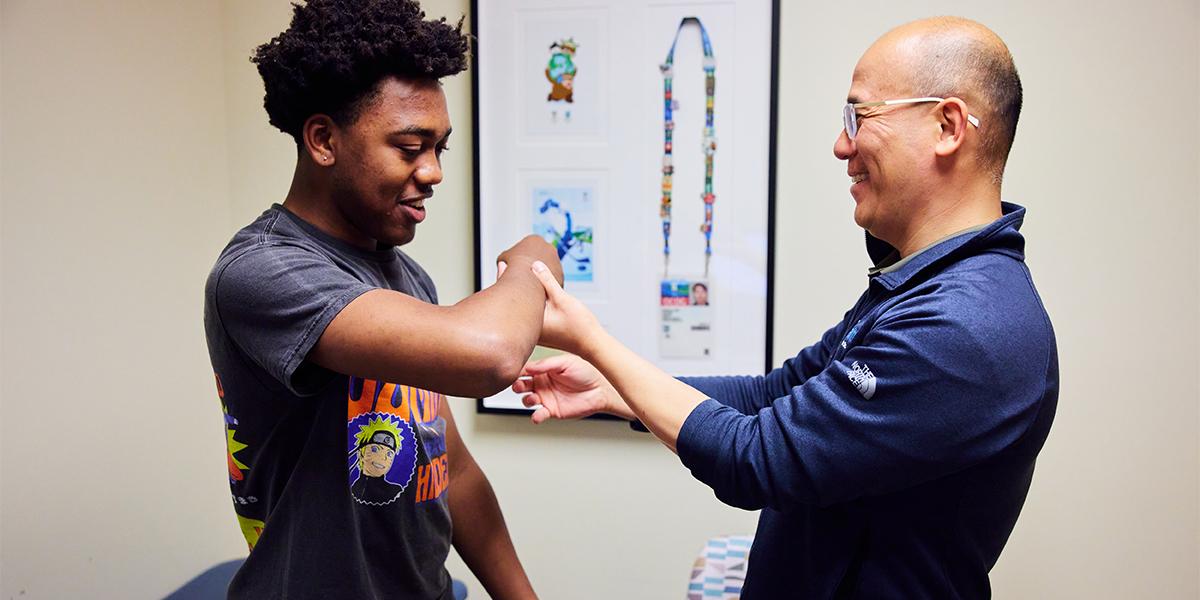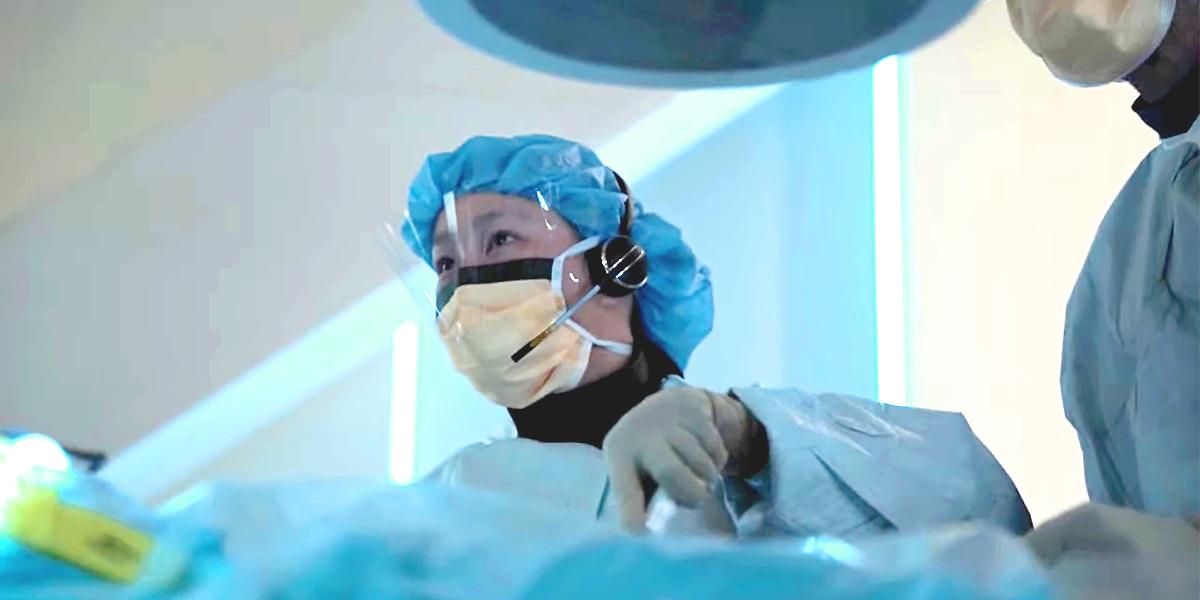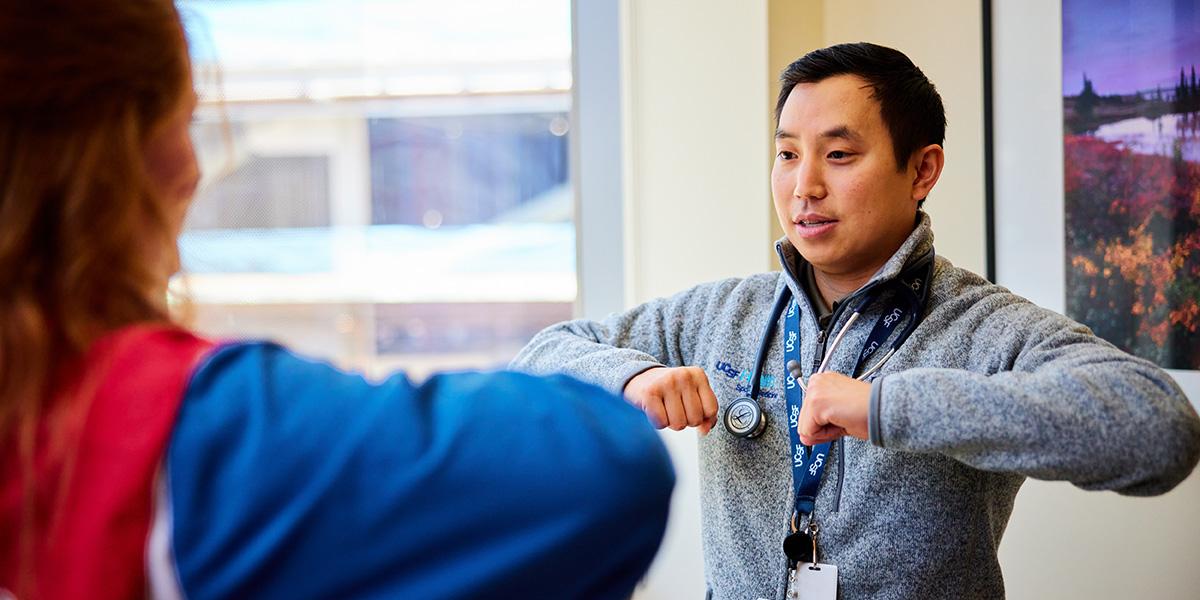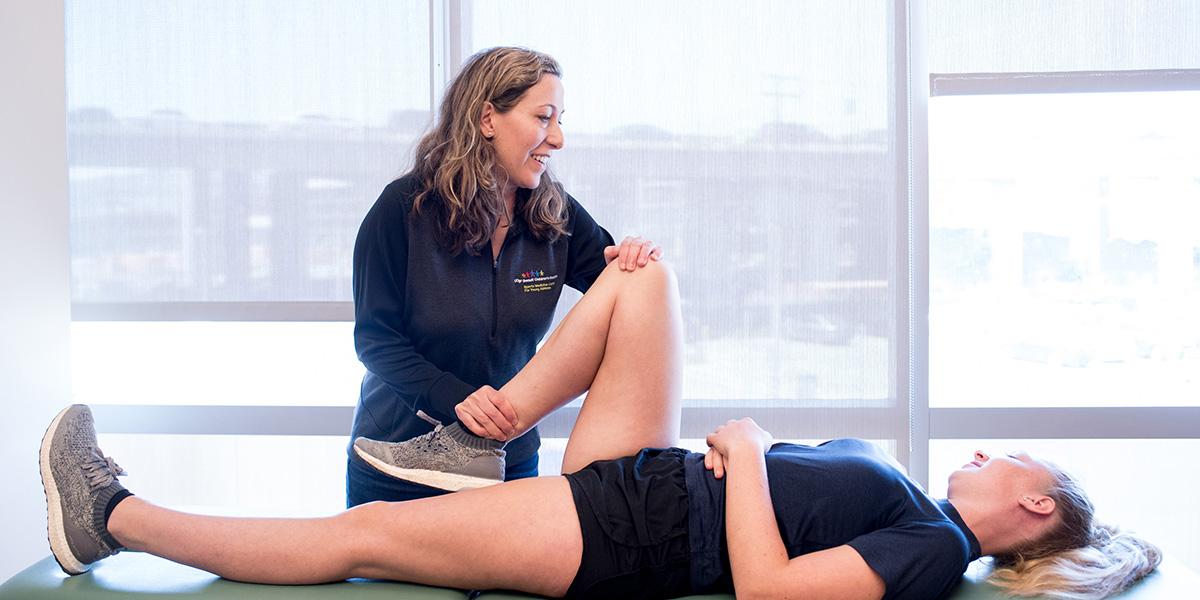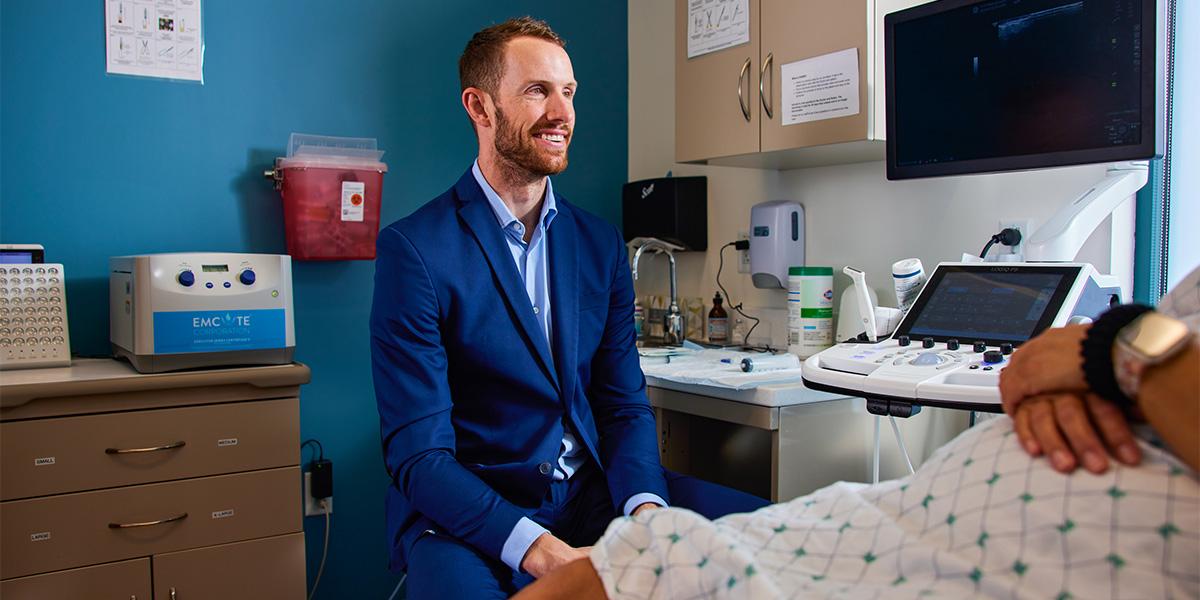Sports Medicine
Our approach
The UCSF Sports Medicine Center is a state-of-the-art facility designed to care for all athletes: young to old, novice to professional, with non-operative and operative conditions. Our goal is to help everyone achieve their highest level of function in sport and life. Common conditions treated include:
Our team
Our multi-disciplinary team consists of fellowship-trained sports medicine orthopaedic surgeons that specialize in arthroscopic surgery, as well as primary care sports medicine physicians, athletic trainers, and physical therapists. We are fully equipped to care for all athletic injuries with on-site clinics and operating rooms, x-ray and high resolution MRI, physical therapy, and a human performance center.
Our fellowships
UCSF Sports Medicine provides two unique year-long fellowship opportunities for post-residency training. The UCSF Orthopaedics Sports Medicine and Shoulder Fellowship, and the UCSF Primary Care Sports Medicine Fellowship.
Team coverage
UCSF Sports Medicine physicians have led the medical staff for several professional and collegiate sports teams including the San Francisco Giants, the Oakland Roots SC, University of San Francisco Athletics, City College of San Francisco Athletics, Academy of Art University Athletics and Cal Bears Athletics. Additionally, we provide athletic training services to more than 20 San Francisco Bay Area highschools through our PlaySafe School Program.
Women's Sports Medicine Center
The UCSF Women's Sports Medicine Center is the first such clinic in the Bay Area to focus exclusively on female athletes. We provide comprehensive orthopedic care to women and girls of all ages and abilities for a wide range of sports-related issues and injuries. Our goal is to help every patient achieve the level of physical activity and performance she seeks. The female doctors making up our team are all athletes themselves as well as national and international leaders in the field of sports medicine.
Outreach
In addition to providing surgical and nonsurgical orthopedic care, we offer guidance on injury prevention and safe returns to play. Patients can consult on-site with a registered dietitian or get an analysis of their running or other sports performance. Our patients also have access to experts in sports nutrition, sports psychology, athletic training and physical therapy, as well as the specialists of the UCSF Human Performance Center and the Sports Medicine Center for Young Athletes. Learn more.
Appointments & Locations
Appointments: 415-353-2808
- UCSF Women's Sports Medicine Center
- Sports Medicine Fellowship Programs
- Sports Medicine Continuing Medical Education Courses
- Sports Medicine Outreach Program
- UCSF Sports Medicine Rehabilitation Resource Guide
- Sports Concussion Center
- Podcast: 6-8 Weeks: Perspectives on Sports Medicine
- UCSF Hip Preservation Center
Sports Medicine People
Common conditions treated include:
- Rotator Cuff Tears
- Shoulder Impingement
- Shoulder Dislocation
- Shoulder Instability
- SLAP Tears
- Shoulder arthritis
- ACL tears
- PCL tears
- MCL tears
- LCL tears
- Meniscus tears
- Cartilage injuries in the knee
- Patella pain
- Patella dislocation
- Runner’s knee and running problems
- Hip labral tears
- Femoroacetabular impingement (FAI)
- Early arthritis of the hip, knee, and shoulder
- Sports-related Concussions
UCSF Sports Medicine has a growing playlist of continuing medical education videos. Visit our playlist.
Featured videos include:
Sports Medicine Rehabilitation Resource Guide
The purpose of UCSF Sports Medicine Rehabilitation Resources Guide is to provide patients with instructional videos and downloadable instructions (PDFs) on how to perform at-home exercises as prescribed by your provider. If you have any questions regarding what is most appropriate for you, please contact your physician at UCSF Sports Medicine at (415) 353-2808 or leave a message for your provider on UCSF My Chart.
Surgical Animations
Please check our library of surgical animations which are specifically designed to help you better understand your particular procedure. The use of surgical animation allows us to present procedures in an easy-to-understand format.
RunSafe is a sports wellness program for runners focusing on personalized health advice, injury prevention, and performance enhancement.
Using assessment and monitoring tools, along with a trusted network of experts, RunSafe provides runners with practical advice on the best practices to help runners achieve their individual goals.
RunSafe engages runners into a comprehensive system for practical behavior change and continued motivation. The program was designed for running athletes of all levels, focusing on injury prevention and biomechanical analysis.
Knowing how to prevent running injuries and practicing safe training methods are the best strategies to running effectively.
Signing up for a RunSafe Assessment at UCSF is simple, and can be done in a few steps:
1. Create an account at www.irunsafe.com
2. Complete your basic information and verify your email address by clicking on the confirmation link in your email.
3. Log in to your RunSafe profile and click “register for an assessment.” Enter your goals, and select UCSF as your RunSafe Center.
In collaboration with clinicians from UCSF Medical Center, UCSF Benioff Children’s Hospital and Zuckerberg San Francisco General, we are among the nation’s top experts on concussion and brain injury. A concussion -- an injury to the brain caused by a blow to the head, neck, or body -- can lead to significant symptoms, and require immediate recognition and proper management. Our multidisciplinary team is comprised of experts from many different fields, including sports medicine, physical medicine and rehabilitation, neuropsychology, neuroradiology, neurology and neurosurgery. Because of this combined expertise, we have the ability to evaluate, diagnose and manage any level of brain trauma. Our mission is to help families safely return their kids to school and sports after concussion.
The UCSF Hip Preservation Center provides comprehensive care for patients with hip disease with strategies to preserve, repair, and restore. From children to adults, the Center provides advanced treatment options tailored to their specific conditions and injuries. To learn more, visit hipcenter.ucsf.edu..
PlaySafe Sports Medicine program
PlaySafe is a non-profit community outreach program run by the Sports Medicine Division at the UCSF Department of Orthopaedic Surgery. Its mission is to provide a safe and positive environment for athletic pursuits, to facilitate access to the highest quality sports medicine care, and to encourage physical and mental growth by empowering student-athletes to lead balanced, physically active lifestyles.
Sports Medicine Center for Young Athletes
Our pediatric-trained orthopaedic specialists work together to provide young athletes with specialized and coordinated sports medicine care. We understand how a growing child’s bones are different from an adult’s bones in how they fracture and how they heal.
-
We are a team of board-certified and fellowship-trained physicians from multiple disciplines, including orthopaedic surgery and primary care sports medicine — making us the region’s most comprehensive sports medicine and orthopaedics group specializing in young athletes.
-
Our team works with all levels of young athletes, from recreational to elite. Our physicians provide care for Bay Area sports clubs as well as UC Berkeley athletic teams, U.S. Olympians, and Paralympians.
-
Each year, our orthopaedic team attends to more than 13,000 patient visits and performs over 1,000 surgeries, bringing together the latest techniques, research, and technology to provide the best care for our patients.
Download: Center for Sports Medicine for Young Athletes Guide
Clinical Research
Located at the Orthopaedic Institute at Mission Bay, The UCSF Sports Medicine Clinical Research Group performs research on many prevalent disabling conditions such as rotator cuff tears, shoulder arthritis, ACL injuries, shoulder instability, cartilage restoration, hip labral tears, concussions, and running injuries.
The research team has experts in the field of sports medicine who have performed state of the art research with clinical trials (randomized, prospective studies, cohort studies), health policy analysis, systemic reviews, and radiographic analyses. The research group is part of multiple multi-center groups evaluating ACL injuries, shoulder instability, and shoulder reconstruction procedures.
Recently published studies include studies on:
-
The effect of pre-operative health and mental status on shoulder function after shoulder replacement.
-
The importance of surgical stabilization on first time shoulder dislocations in a multi-center national study.
-
Novel techniques to decrease pain after shoulder replacement.
-
Outcomes after revision ACL reconstruction
Translational Research
The focus of the sports medicine translational research team is to use a ‘bench to bedside’ approach to investigate the basic mechanisms of injury and repair, and evaluate techniques to improve outcomes by understanding the cellular, molecular, and biomechanical changes that occur after sports injuries.
Rotator Cuff and Muscle Injuries: Drs. Brian Feeley and Xuhui Liu are studying the stem cell changes that occur after rotator cuff injuries. As patients have rotator cuff tears, the muscle can undergo characteristic changes in the muscle where the muscle becomes smaller (muscle atrophy) and transforms in part in to fat (Fatty infiltration). The research team, a collaborative effort between UCSF Orthopaedic Surgery, UCSF Stem Cell Center, and the SF VA hospital, is studying how certain stem cells can be stimulated to ‘turn bad fat into good fat’ and improve muscle quality and function after a rotator cuff repair. The study is funded by the NIH and VA.
Biomechanics of Injury Patterns: Led by Drs. Lotz, Ma, and Feeley, the Sports Medicine research team is using low cost motion analysis cameras in clinic to evaluate biomechanical motion patterns that can predict lower extremity injury such as ACL tears and early arthritis, and study how to improve outcomes and return to play status after knee surgery and ACL reconstruction. The novel technology, developed in part at UCSF, is also used to follow shoulder reconstruction patients after surgery to help provide more clinically relevant information on motion patterns and outcome.
Advanced Imaging Research
Using state of the art MRI techniques and through a long standing collaboration with researchers in the UCSF Department of Radiology, the sports medicine faculty have developed innovative techniques to follow outcomes after ACL reconstruction and meniscus injury and repair as well has hip labral repair and reconstruction.
ACL Reconstruction: Under the direction of C. Benjamin Ma, MD, current research focuses on evaluating the long term outcomes of ACL reconstruction on knee kinematics and cartilage health. The research team has used high resolution cartilage mapping to study the outcomes of ACL reconstruction and its relationship to cartilage health. Dr. Drew Lansdown is using MRI mapping strategies to evaluate ACL graft health after reconstruction to help predict graft health and return to play criteria.
Hip preservation: Director of the UCSF Hip Preservation Center Dr. Alan Zhang is currently evaluating how arthroscopic hip labral repair and reconstruction can affect cartilage changes and prevent degenerative changes in patients with labral tears and femoroacetabular impingement.
